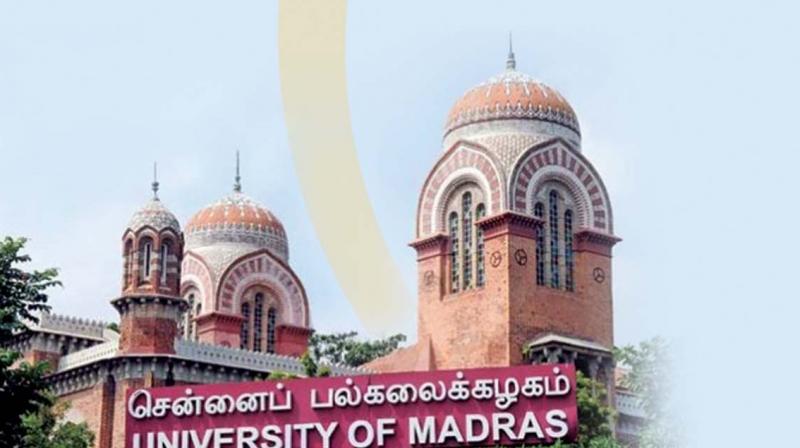E-VidyaBharati to bring in money to cash-strapped MU
E-VBAB project is an extension and phase 2 of Pan-African e-Network project implemented from 2009 till 2017.

Chennai: The launch of e-VidyaBharati and e-AarogyaBharati (e-VBAB) project by the ministry of external affairs last week could not have come at the right time as already the cash-strapped University of Madras is staring a financial crisis following the setback in offering distance education programmes.
E-VBAB project is an extension and phase 2 of Pan-African e-Network project implemented from 2009 till 2017. In the first phase, the tele-education project was implemented in 48 African countries.
Though the financial details are yet to be out, the university which is one of the five partner educational institutions for implementing the project can possibly generate anywhere from Rs 5 crore to Rs 10 crore per year for five years, sources said.
Over the five-year project duration, e-VBAB Network Project will provide free tele-education courses to 4000 students every year from African countries. The project will be completely funded by the Government of India for its entire duration. It also envisaged providing telemedicine facilities to African hospitals.
“With the successful completion of the first phase, the Madras University is geared up for the second phase,” said V. Bharathi Harishankar, head, department of women’s studies and co-ordinator of Pan-African e-Network Project, University of Madras.
“In the first phase, 1,813 students from 23 African countries including Somalia, Egypt, Rwanda and Sudan have passed out in M.Sc., (Information Technology) and BBA courses. The courses were conducted in five batches,” she added.
In the first phase, the university has given only two courses. However, in the second phase, the university is preparing to offer several programmes.
“Our courses are very popular among the African students. This time we have shown our interest in several areas,” Bharathi Harishankar said.
Along with University of Madras, Delhi University, Birla Institute of Technology and Science (BITS), Pilani, Indira Gandhi National Open University (Ignou) and Amity University will offer the courses to African students under e-VidyaBharati.
The central government will offer scholarships to African students through which each institution can earn up to Rs 10 crore per year under this project.
The university is now looking to boost its revenue through online programmes. “Unlike the distance education courses which have the territorial restrictions, the online programmes do not have any jurisdictional boundaries. It could be offered to students from any part of the world. It will definitely boost the university's revenue,” sources said.
“Madras University has pioneered in providing online courses. We expect to do well in phase 2 of the project as well. Both the Pan African e-Network project and the virtual university will be brought under the newly launched Centre for Web-Based Learning,” said P.Duraisamy, Vice-Chancellor, University of Madras.
The distance education programmes offered by university faced a setback as the UGC had given its approval for only three courses out of 53 courses.
“We have taken corrective measures and expect the approval for at least 26 courses from the UGC. These courses account for over 95 per cent of enrollment in distance education programmes. Further, the university will take efforts to offer remaining courses from next academic year,” he added.
The ministry of external affairs (MEA) and Telecommunications Consultants India Ltd (TCIL) have signed an agreement for the implementation of e-VidyaBharati and e-AarogyaBharati (e-VBAB) network project in Africa last week. This project is being seen as important one in India’s partnership with African nations.

